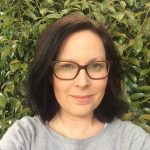
KATHERINE SPEIDELL’S close-cropped, pink hair is only temporary, a reminder of her inclusion in the recent ‘Shave for A Cure’ for blood cancers.
It is yet another example of how Kat, as her friends call her, pushes the boundaries as a young leader in her various communities.
That ability saw her selected as one of 18 young people from Australia, New Zealand and Asia to attend the 20-day Global Leaders Delegation throughout Europe starting on January 4.
At just 17 years old, Kat, now in her final year at Papamoa College in Tauranga as deputy head girl, was the youngest eligible age to take part in the delegation.
She was up against masters students from universities all around the country, Kat didn’t think she had a chance at securing a spot in the delegation — not that she let that stop her from applying when she heard about the opportunity.
“I read through it and I thought: I don’t think I’m going to get in to this, but I can’t not apply and know that I didn’t have a chance.”
Crimson Education, the organisers of the delegation, thought otherwise. Kat made the cut, perhaps not surprising considering her impressive list of accomplishments last year. Co-leader of the Papamoa Enviro Council, Rainbow Youth Facilitation Alumni and Project Ignite Summer Student Incubator mentor — Kat completed over 400 hours of volunteer work in 2017 and received the Papamoa College Lions Award for Community Service.
The opportunity to travel across Europe visiting top universities like Oxford, Cambridge and the London School of Economics, as well as historical sites and government facilities, was a well-deserved honour for this busy, high-achieving teen.
Stopping in Prague, Czech Republic for five days to attend the International Youth Leadership Conference alongside approximately 70 young people from around the globe was a highpoint of the trip.
The conference provided a unique opportunity to develop skills in public speaking, leadership and teamwork with attendees taking part in debates and a range of simulations like United Nations Security Council meetings and an International Criminal Court trial.
“Going into it I definitely thought I’d be more nervous or homesick, but it was just every day was so full and there were so many cool people, I didn’t even have a chance to feel anything like that, because it was just so fun. Cold — but fun.”
A personal highlight for Kat was visiting the large hadron collider at CERN, the European Organization for Nuclear Research, in Switzerland where Kat says she was “literally squealing out loud with excitement” and the headquarters of the United Nations in Geneva, “the epicentre for human rights”.
But perhaps the most valuable thing Kat returned home with was new friendship.
“In a lot of situations it would have been [challenging travelling with 17 strangers] but because the group of people that ended up being chosen were all really passionate and driven and just so motivated it was hard not to get along immediately.
“So many of us come from a background where we’re constantly striving towards goals and being around people who say ‘oh you’ll never get there’ or don’t have the internal drive to keep doing stuff.
“Having an entire group of people that were excited and driven meant we could open up and be ourselves. And even though it was only three weeks, we’re already planning a reunion in July and we all correspond daily. Definitely lifelong bonds formed.”
Kat has Asperger’s, but she says “it doesn’t come up super often day to day.”
“I think it’s definitely something that influences everything I do and it’s a part of me that I think is really important to my identity. But, it’s not something I want to use as an excuse to not accept challenges.
“I think no matter what type of unique situation someone faces — regardless of whether or not they have a diagnosis or whatever else that might be unique to them — it’s really self-defeating to say because I’m on the spectrum I can’t do this. That’s not to say it might not be more difficult because how my mind works, but that actually makes it an exciting challenge.”
It’s a powerful message for the young people supported by One: Unique Minds, an organisation offering peer mentoring and social groups to young people on the autism spectrum, where Kat’s employed in the role of chief operating officer.
“One of our business mottos that makes us a bit unusual is regardless of what position anyone holds in the business, everyone needs to be involved on the ground some way so you can stay connected with the roots of what’s motivated you to get involved in the first place.”
That means Kat’s not only there to “make sure all the boxes are ticked and the proposals are written”, but once a week she’s also Dungeon Master for one of the social Dungeons and Dragons groups.
Kat is studying scholarship accounting, business and English at Papamoa College, all while completing a self-directed project on youth suicide. She also intends to continue peer mentoring and volunteering for organisations that support young enterprise and LGBTQI issues.
This, says Kat, is her version of taking it easy this year.
While Kat has big goals for the future, she’s not too concerned about pinning down the details just yet. She hopes to take a gap year to work and travel, before embarking on an undergraduate conjoint degree in business and law. She wants to stay in New Zealand — initially at least — although postgraduate study at Oxford University or an Ivy League college in the US beckons. But nothing is set in stone.
“It’s better to figure out a rough plan and give myself room to change,” says Kat.
And as for the hair? She thinks she might go purple next.
- Our autism community prefers the use of the term autism but we have chosen to go with Kat’s preferred terminology of Asperger’s.


